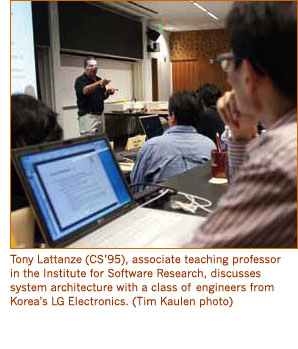
- Outreach from the Institute for Software Research strengthens international relations between the U.S., Asian allies
Van Lang University, Ho Chi Min City, Vietnam, March 2009: Don Marinelli, waits backstage to present "The Triumph of the Gamer," his talk on the emergence of computer gaming as a major cultural force. Suddenly, the crowd of 800 Vietnamese college students begins to whistle and shout as though awaiting the appearance of a rock star.
"Who are they cheering for?" Marinelli asks his host.
"You," the host answers, stunning Marinelli. During his tour of Vietnam, Marinelli, executive producer and co-founder of CMU's Entertainment Technology Center, also visits Duy Tan University in Da Nang and talks to VNN, the Vietnam News Network in Hanoi, evangelizing the promise of "edu-tainment," the hybridization of digital technology with art.
Marinelli's Vietnam tour was orchestrated by John Kang, director of Asia Collaboration for Carnegie Mellon's Institute for Software Research. Kang creates collaborative relationships between the School of Computer Science and companies, governments and universities in countries such as China, Vietnam, Korea and Japan. His efforts typically result in either Carnegie Mellon faculty going to Asia to teach, as in the case of Don Marinelli, or Asian workers coming here to study, as in the case of 29 engineers and managers from LG Electronics who came to the Pittsburgh campus in July to take a customized five-week program on software architecture taught by Tony Lattanze and other instructors in the Institute for Software Research.
In addition to studying software architecture under Lattanze, teaching professor and director of ISR's Embedded Software Engineering Program, the LG engineers used their technical and managerial experience to organize two competing teams to develop an interoperating multi-robot system. The project was designed as a scale model robotic seek-and-transport system that was laid out at the front of their classroom in the Gates Center.
This is the fourth time in as many years that LG Electronics has sent a group of engineers and managers to Pittsburgh for training. On previous occasions, training focused on leadership development. LG has engaged SCS to train its employees as part of its effort to succeed in global markets, says LG's Jin Gyoo Choi during a break.
"The company realized that if they want to be a long-term partner with customers, they had to focus on software engineering because it's the very start of the product," says Choi, chief technology officer for LG's Human Resource Team. "These education courses improve engineers' work attitudes. And because they are all leaders, when their attitudes improve, everybody's improves. The organization improves."
SCS's links with Korea are deep, thanks in large part to Kang. He came to the university in 1996 while working as a freelance consultant for the state-owned Korean Electric Power Company, which asked him to develop an executive education program and investigate electric power and IT technologies in the United States.
By the time he'd completed his assignment for the Korean government, Kang knew a lot about electric power, information technology and executive training on both sides of the Pacific. He'd also established a solid professional network in Korea. In 1999, when the Institute for Software Research was founded under the leadership of former SCS dean Raj Reddy, Kang's strong network and broad experience made him a natural candidate to lead the Institute's Asian Outreach Program.
"The Korean relationship became a model for ISR to apply to other countries," Kang says. "I'm trying to bring the Korean model to Vietnam and China and Japan." Kang is trying to build relationships not just with universities and corporations, but also with other nations. And it's not an exaggeration to say that these kinds of educational partnerships are helping to build international goodwill. During a visit to Western Pennsylvania in June, the Vietnamese ambassador to the United States, Le Cong Phung, said partnerships between Pittsburgh universities such as Carnegie Mellon and Vietnamese universities are having a profound and positive effect on relations between the two nations.
"Everything you are doing in Pittsburgh to help Vietnam, to assist Vietnam, to cooperate with Vietnam, is in the interest of our two nations," Phung said. "What you are doing will be a great contribution to the promotion of our mutual relations."
In South Korea, SCS partnerships developed by Kang reach right up to the office of Lee Myung-bak, President of the Republic of Korea. Others include affiliations with five government ministries, eight government agencies, three large city governments, 10 universities and several large corporations, including LG and Samsung, along with many small IT companies.
"We're actually going out and creating the relationships and bringing in collaborative work, whether it's training, or research and development, or core technology development," says Kang, who adds that he goes right to the "roots" of the organizations he needs to connect with. "People I know help me find the people who are in the right positions in government, academia and industry. I find a mid-level manager and I penetrate from there."
LG's Choi admits to having initial reservations about signing on with an American university. "We were concerned about the cultural divide between academia and industry," he says. After meeting with SCS faculty, those concerns "disappeared," Choi says.
"We found that the Carnegie Mellon professors had several years of practical experience in industry," he says. "Now, I want to (create) a long-term partnership with CMU."
For More Information:
Jason Togyer | 412-268-8721 | jt3y@cs.cmu.edu

